Dental Implant is the most popular option for replacing your missing tooth or teeth. In the past decade, they have unquestionably changed the direction of dentistry
A dental implant is essentially a titanium post that is surgically inserted into the jawbone below the gum line. Then the implantologist will place a crown on top of the surgically inserted Titanium implant To ensure that it looks like a natural tooth.
Tooth Implants will also function as a natural tooth rather than just looking good and feeling real.
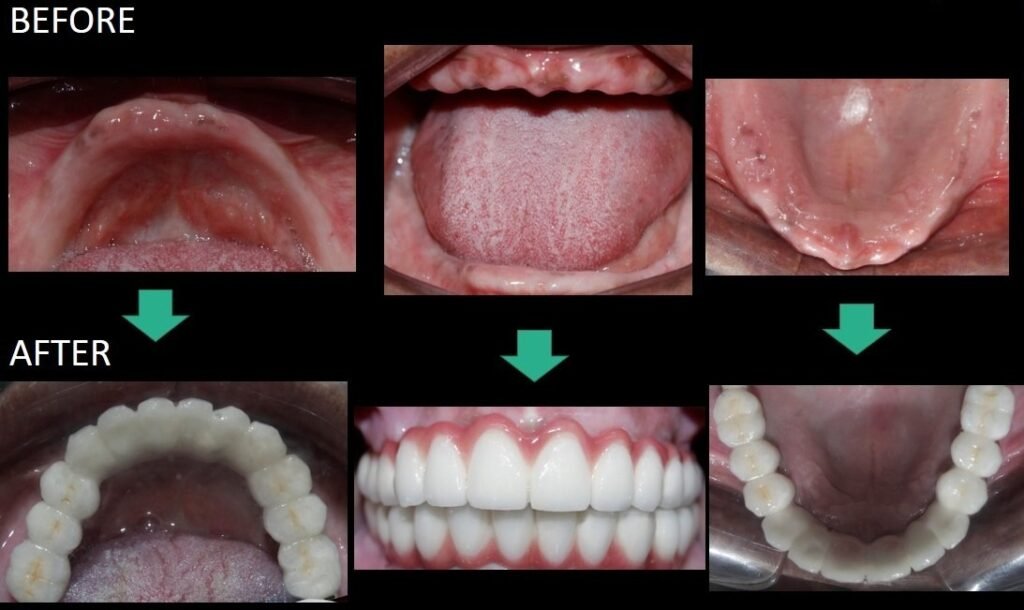
Dental implants have gained popularity due to their numerous benefits. Unlike traditional dental bridges or dentures, dental implants do not rely on adjacent teeth for support, thus preserving healthy teeth and preventing further damage. Moreover, dental implants are long-lasting and durable, with a success rate of over 95%. They are easy to maintain and clean, and with proper oral care, can last a lifetime. Dental implants also offer greater comfort and convenience, as they do not require any adhesives or special cleaning solutions.
With all these advantages, dental implants have become the go-to solution for those with missing teeth, offering not just a cosmetic fix, but a comprehensive dental restoration. They have transformed the way dentists approach tooth replacement, providing a more natural, comfortable, and reliable alternative to traditional options. As a result, more and more patients are opting for dental implants to improve their oral health, restore their confidence, and enhance their quality of life.
To replace a single missing tooth:
If a tooth is lost due to injury, decay, or other reasons, a dental implant can be used to replace it. The implant is placed in the jawbone and topped with a crown, which looks and functions like a natural tooth.
If multiple adjacent teeth are missing, a dental bridge can be used to fill the gap. The bridge is supported by dental implants on either side of the gap, which provide a stable foundation for the replacement teeth.
For people who have lost all or most of their teeth, dentures can be used to replace them. Dental implants can be used to support the denture, providing a more stable and comfortable fit.
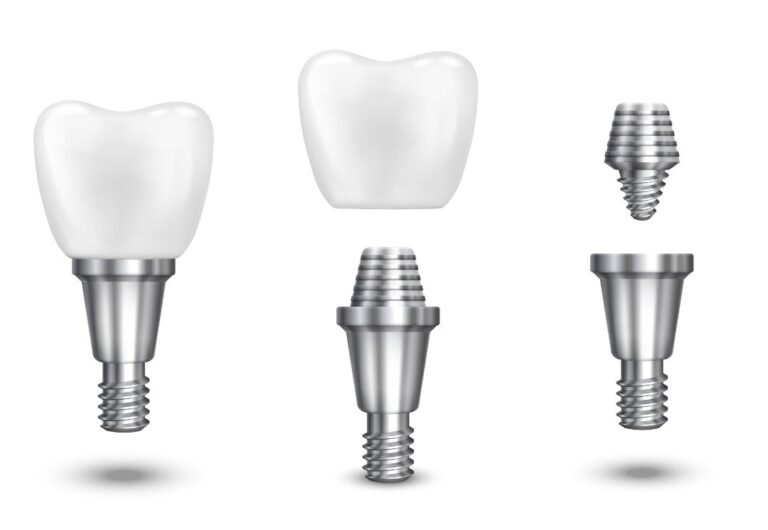

In cases where a tooth is too damaged by decay to be restored with a filling or crown, it may need to be extracted. Dental implants can be used to replace the missing tooth, preventing the adjacent teeth from shifting and maintaining the integrity of the bite.
The jawbone deteriorates over time when a tooth is missing. Dental implants stimulate the jawbone, preventing further bone loss and helping to maintain the shape and structure of the face.
Advanced periodontal disease can lead to tooth loss, as well as bone and gum tissue damage. Dental implants can help to stabilize the remaining teeth and prevent further bone loss.
Dental implants help in providing a stable and durable foundation for replacement teeth / Artificial teeth. Unlike dentures, which can slip or move around in the mouth, implants stay in place and allow for natural chewing and speaking.
Implants are by design made to look and feel like natural teeth. They can be customized to match the color, size, and shape of your existing teeth, so they blend in seamlessly with your smile.
With decent care, dental implants will last for years or even a lifetime. This makes them a good investment in your oral health and overall well-being.
Unlike dentures, which require messy adhesives and regular adjustments, implants are a permanent solution that requires no special care beyond regular brushing and flossing.
Dental implants help to stimulate the bone and prevent further deterioration of bone When a tooth is lost. tooth Implants can help to maintain the structure of the face and prevent a sunken-in appearance.
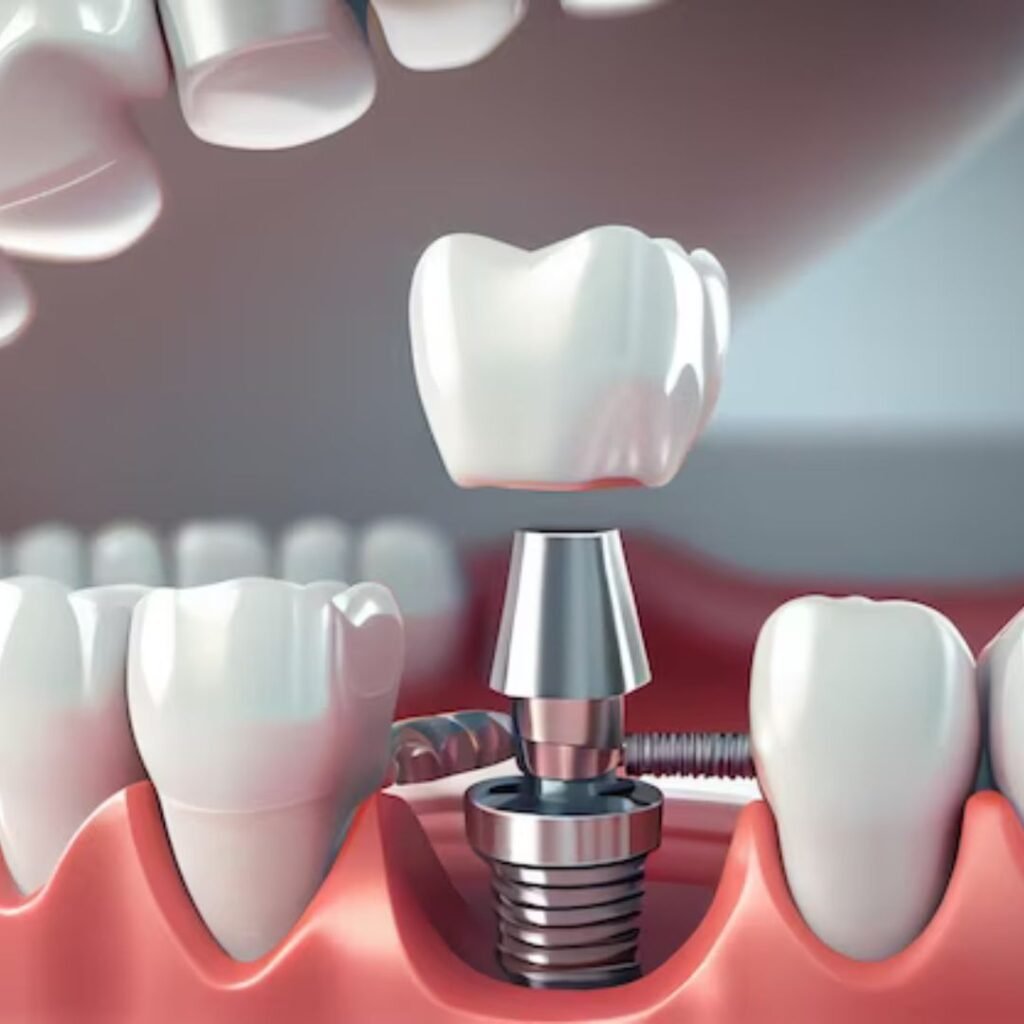
Various specialists may be involved in the planning process for dental implants. The process may involve
Comprehensive and detailed dental examination: Dental X-rays, 3D images, and models of your teeth and jaw will be created.
Review your medical background. Any history of medical issues, along with a prescription, OTC drugs, and dietary supplements, should be discussed with your doctor. Your doctor might advise taking antibiotics before surgery to help prevent infection if you have certain heart conditions or orthopedic implants.
Plan of treatment. Complete customization is done at this level. The number of teeth that needed to be replaced and other aspects like jawbone and teeth health are discussed in this step.
Modern dental techniques make it possible to perform the implant placement procedure painlessly and comfortably. Concerned patients may also request sedation from the dentist to feel at ease during the placement of a dental implant.
Initially, minor surgery is made to expose the bone and the bone is drilled deep to place the titanium implant.
In situations, where the bone is too weak or not strong enough to support implant surgery, the doctor may recommend bone grafting.
After that, a temporary crown is placed to fill the gap. The patient must wait until the bone has fully healed for further procedure
The jawbone will expand and fuse with the dental implant’s surface during this process. This process, also known as osseointegration, aids in providing a sturdy foundation for the new artificial tooth, similar to what the roots do for natural teeth.
Depending on the structure and health of the bones, this process typically takes between three and six months. However, when patients have healthy bone structures, the entire procedure can be finished in a single day.
To determine whether the implant is suitable for the second surgery, your dentists will take an x-ray.
The second procedure will be less complicated than the first, in which a new incision is made to expose the implant heads.
A metal extender known as an abutment is bolstered to the implant. This could happen either during the initial procedure or a subsequent small procedure performed under local anesthetic.
The replacement tooth is joined to the implant using abutments.
The surgeon might have to make an incision If gum tissue has developed over the implant during the second procedure. To safeguard the implant from gum tissue growing and covering it, a healing cap on top of the implant.
The healing cap will be taken off during the second procedure, and the dental implant will then be screwed with the abutment. Following that, the gum tissue will naturally grow around the abutment.
the gums are then left to heal. after the healing process, further procedures will be done.
Once the healing is completed, the impression of your teeth is taken to match the replacement tooth or teeth will match the surface texture, color, and anatomy of the rest of the natural and healthy teeth.
The replacement teeth can be fixed or removable accordingly to the patient’s wish.
If you choose a removable tooth, it will be fixed to an abutment using a metal frame. this type of tooth can be extracted at home for cleaning.
If you choose a fixed tooth, it will be screwed or cemented onto the abutment permanently.
The new replacement teeth will both look and feel like natural teeth. It has to be taken care of by brushing and flossing as usual. There is no need for any Special material or tools for its cleaning.
Don’t forget to schedule routine dental checkups as well. Tell your dentist if you experience any of the following in your mouth:
Some patients may be concerned about the price of dental implants, but they are not very expensive. Each procedure involves a number of steps, which gives the impression that implants are expensive.
It is crucial to realize that if a missing tooth isn’t replaced with an implant, the neighboring teeth will eventually start to shift and the jawbone might weaken, which will eventually become much costlier to replace multiple teeth.
Even though dental implants have been used to replace missing teeth for ten years, many of us still find the procedure to be unfamiliar. Therefore, one should fully understand the dental implant procedure and take into account all relevant factors when comparing dental implant costs and prices.
The cost of full mouth Dental Implant treatment is determined by the implant type, the number of implants needed, the material with which implants are made, warranty of the final prosthesis, and any additional surgical procedures required.
Dental implant surgery costs in India can range from INR 15,000 to INR 1,000,000.
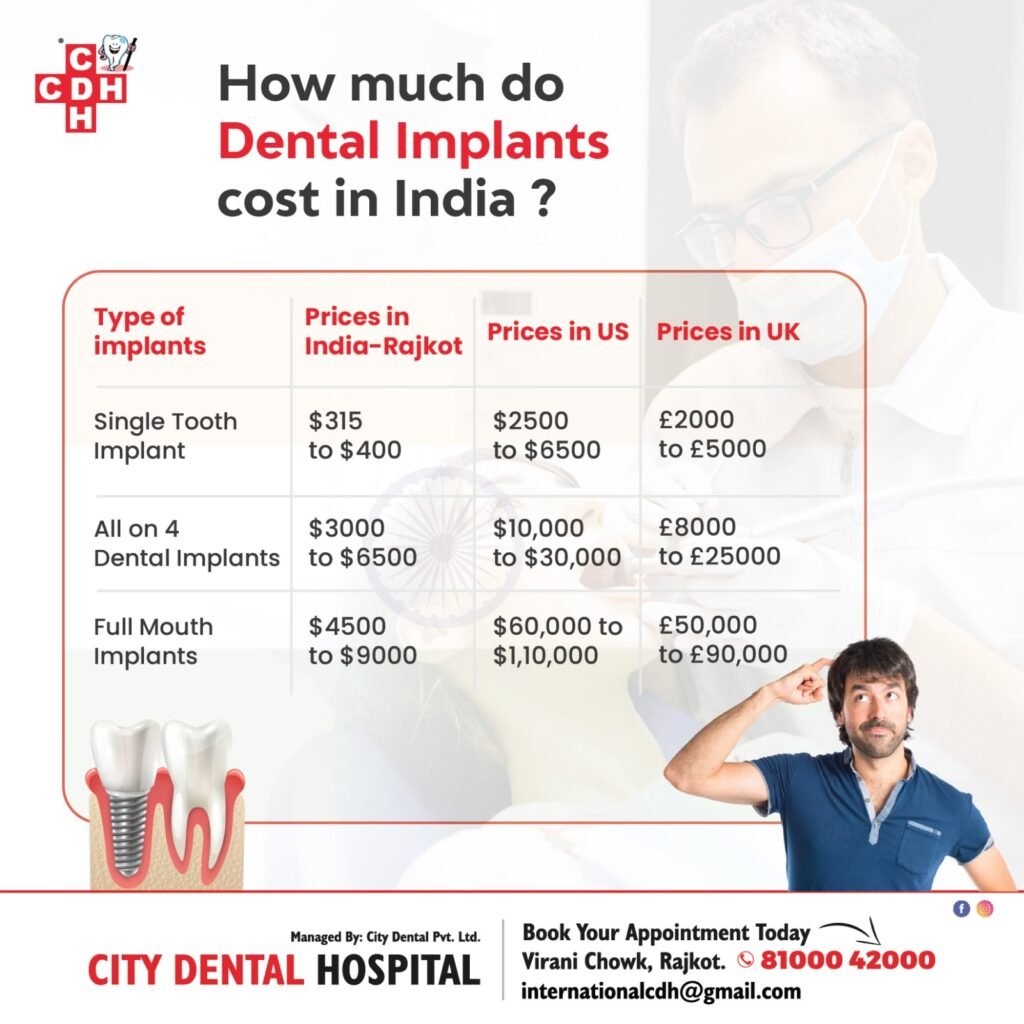




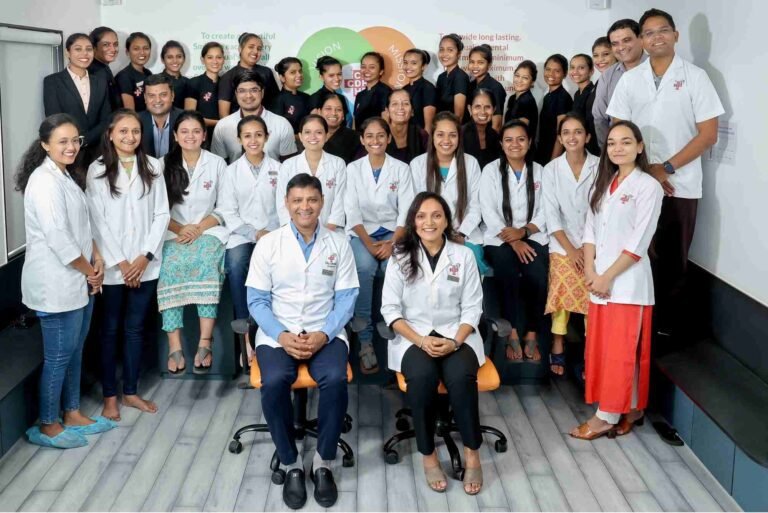






Dental implant placement may involve some discomfort during and after the procedure, but the level of pain varies depending on individual factors such as pain tolerance, the extent of the procedure, and the surgeon's expertise. However, modern anesthesia and sedation techniques can help manage any discomfort, and post-operative pain can typically be managed with over-the-counter pain medications or prescription painkillers. In general, most patients report that any pain or discomfort associated with dental implant surgery is well-tolerated and outweighed by the long-term benefits of having a functional and aesthetically pleasing dental restoration.
No. This is the most critical part of the treatment process and from where most mistakes can be traced. Our assessments consist of 1 hour with a dentist, all the required x-rays, detailed planning, models and surgical guides, together with a written treatment plan, all included in one time consultation fee. For more information about treatment costs click here Fees and Finance .
There is no strict rule against consuming dairy products after dental implant surgery, but some dentists and oral surgeons may advise their patients to avoid dairy for a few days following the procedure. This is because dairy products can be high in fat, which can interfere with the body's ability to absorb antibiotics and other medications prescribed for the healing process.
The duration of a dental implant procedure can vary depending on several factors, such as the number of implants needed, the complexity of the case, and the patient's overall oral health. In general, a single dental implant placement can take anywhere from 30 minutes to an hour. However, more complex cases, such as those involving multiple implants or bone grafting procedures, may require several hours or even multiple appointments to complete.
We choose the best system for each individual case. The three main implant systems that we use are
All the system used in CE certified, FDA approved implant system. There are cheaper systems available but they do not have the research, quality, backup and reliability that we require. We are also aware of clinics in the India using copy implants. Just like any other fake goods they rarely live up to expectations and we will NEVER risk our patient’s care, security and the longevity of their results with fake implant components. Always look for reviews and testimonials from real patients to establish the true quality of a dental implant centre at City Dental Hospital Rajkot.
Yes, we offer 5 years warranty. Warranty means that if implant fails it will replaced free of cost. This does not include surgical charge of dentist city dental team, Rajkot, Gujarat.
After flawless dental implants treatments you will be normal in one day to three days.The jaw bone will begin to grow around your implants.This implants then becomes part of your natural gum line.This process varies from person to person and system used in placements,can take anywhere between 3 days to 3 months.Once your implants is stable enough,we will place abutment & crown on top of the implants.You can start chewing immediately after placing crown as per instructions.
Dental implants are a long-term solution for replacing missing teeth. With decent care and maintenance, dental implants will lasts a lifetime. Studies have shown that dental implants have a success rate of over 95%, making them one of the most successful and reliable tooth replacement options available.

City Dental Hospital is a leading Dental Implant Clinic in Gujarat, India. We focus on providing the very best treatment & protocols for dental implant solutions, full smile makeovers, crowns & bridges, FMR, Aligners, Orthodontics (braces) almost with all other specializations of dentistry with our expert team & facilities. Smile confidently with us!!
